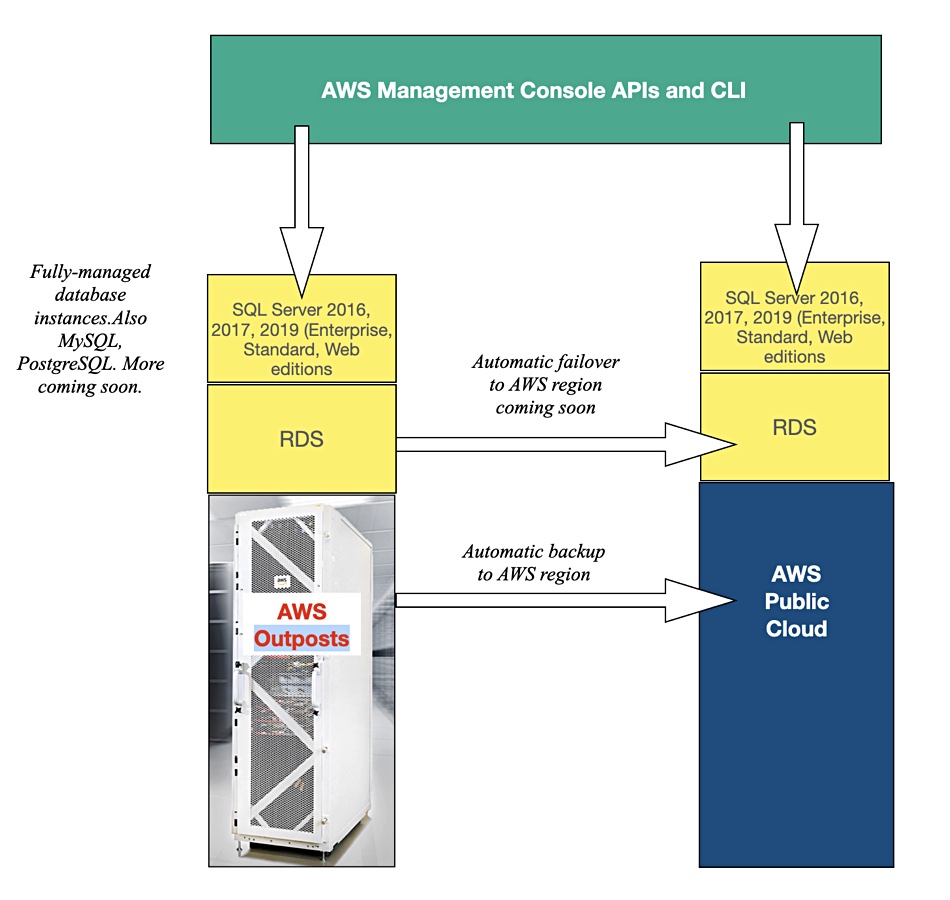AWS has made SQL Server running on its Outposts Relational Database Service (RDS) generally available, extending its hybrid cloud database coverage, with more supported databases to come.
The news was revealed in an AWS blog that said Outposts RDS specifically supports Microsoft SQL Server 2016, 2017, and 2019 in Enterprise, Standard and Web Editions.
Outposts is the Amazon Web Services cloud hosted in a fully managed on-premises or co-location hardware box. The converged system encompasses compute, storage, networking, database and includes the same AWS infrastructure, services, APIs, and tools you’d find in the AWS public cloud. It is intended for workloads needing low-latency access for local data processing and data residency and to support application migration to AWS over a prolonged time period.

Outposts RDS is ordered and managed through the AWS cloud management console. The RDS instance can be automatically backed up to a nearby AWS region. Automatic RDS failover to an RDS instance in the region will be coming soon. Amazon says it will support more databases, presumably relational ones, in the future.
Outposts also supports Amazon’s ElastiCache memory database and its ALB application load balancer.
The Outposts hardware is currently a 42U rack that can scale out to 96 racks. Later this year it will be available at a much smaller scale; 1U and 2U servers.
Specs
The 1U Outposts provides 64 vCPUs, 128 GiB memory, and 4TB of local NVMe storage. The 2U Outposts provides up to 128 vCPUs, 512 GiB memory, and 8TB of local NVMe storage, with configurations that support accelerators like AWS Inferentia or GPUs. Each will allow customers to run Amazon Elastic Compute Cloud (EC2), Elastic Container Service (ECS), Elastic Kubernetes Services (EKS), and Virtual Private Cloud (VPC) on-premises.
A VMware variant running a fully managed VMware Software-Defined Data Center (SDDC) will also become available this year.
AWS added S3 Outposts support to the existing Elastic Block Store (EBS) support in October last year. Third-party filesystems and data protection services are available from Clumio, Cohesity, Commvault, CTERA, NetApp, Pure Storage, Qumulo and WekaIO.
Comment
AWS is extending its own hybrid cloud to more of the on-premises data processing environment. Existing SQL Server customers will be able to use Outposts RDS/SQL server as an on-ramp to the AWS cloud. AWS will be able to say that its AWS hybrid cloud offers a more consistent hybrid cloud experience than, for example, Dell, HPE, Pure and NetApp because its hybrid cloud is made up from AWS native software through and through whereas its on-premises competitors’ hybrid cloud is not.
VMware appears to be escaping this trap with the coming Outposts version of its SDDC.
Our understanding is that AWS’s coming mini-Outposts servers will be, in effect, hyperconverged systems. Once they are available, AWS should be regarded as an on-premises server systems supplier, competing with Dell, HPE, Lenovo, Supermicro and other server suppliers, and also hyper-converged infrastructure vendors, for the edge processing market.
Because AWS will be using its own hardware, it could add in its Nitro acceleration and also Graviton (Arm) CPUs. Nothing yet has been said about making its RedShift data warehouse available on Outposts.








